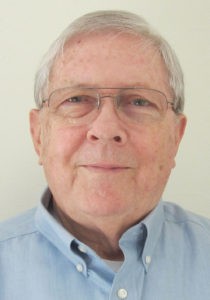“There is neither Jew nor Greek, there is neither slave nor free man, there is neither male nor female; for you are all one in Christ Jesus” — Galatians 3:28
“Pray without ceasing.” —1 Thessalonians 5:17
During the past several weeks, the above Scriptures have been foremost in my thoughts. Perhaps the situations surrounding the many troubling events that have occurred in our nation during the past year have finally boiled down to how I understand and thus apply the above Scriptures in my own life.

Earl Chappell
Galatians 3:28 may have direct application as to how I deal with all sorts of situations within the church. Then 1 Thessalonians 5:17 seems to have direct application as to how I approach my life and its outward reach. I approach all Scripture as a layperson with many years of experience in the church as a Bible teacher, deacon and other functions.
When Paul wrote about the position of persons within the body of Christ, he addressed the fact that all have the same standing without respect to ethnicity, human bondage and gender. As he said, “For you are all one in Christ Jesus.”
If this is true, why do Christians see fit to continue to draw distinctions where none should be drawn? Paul has implied that all who are in Christ are equally capable of being drawn into his or her own perceived personal calling to serve Christ and Christ’s church.
There is no doubt in my mind that a coupling of God’s word, our life experiences and the influence of the Holy Spirit have a direct impact on the life of a believer. As I have continued to grow in my understanding of God’s word, my views of the world, the church and others have changed. When I have doubts about certain applications of the Bible on certain experiences within the church and in life, I reflect on Galatians 3:28.
If this verse is indeed true, no believer can be excluded from serving in any capacity within the church of Christ Jesus. Furthermore, to continue Paul’s inspired thoughts on the matter, all human beings who believe in the Lord Jesus Christ are one. (Jesus expanded the relationship between human beings when he taught about loving our neighbors.)
“If this verse is indeed true, no believer can be excluded from serving in any capacity within the church of Christ Jesus.”
Perhaps it may be as distressing to you as it is to me to see professing Christians demonstrate hatred toward their fellow Christian brothers and sisters. It is one thing to have disagreements within the church body; it is entirely another matter to have expressed hatred.
This is the point where I interject Paul’s words regarding prayer. He states in 1 Thessalonians 5:17, “Pray without ceasing.” For me, this has been a real challenge. What does this look like in application?
Some have reflected on the words recently spoken on the U.S. Senate floor by Sen. Raphael Warnock when he referred to voting as “a kind of prayer.” His words expanded my own developing understanding of this verse. This single verse has the power to exercise control over my whole approach to life. It controls my attitudes, my speech, my behaviors, my thoughts.
“Through prayer, I can resolve the issues that seem to plague humankind today.”
What do I get when I put both verses together? Through prayer, I can resolve the issues that seem to plague humankind today. I am free to love my neighbor as myself. I am free to love my enemies. I am free to accept the unacceptable. I am free to accept those whom God has called to serve God in any capacity, regardless of outward appearance or status in life.
Who am I to judge those whom God has called to minister in God’s name? God has clearly told me about those whom I should avoid in 2 Timothy 3:2-5.
The political rhetoric of today, especially that espoused by some professing “Christians,” is very troubling as it relates to the two verses above. When Christians demonstrate peacefully to petition their local, state and national authorities, they are acting appropriately. By and large, their signs and banners are respectful and speak to the point. Unfortunately, most demonstrations have a mixture of Christians and non-Christians. Woe to those Christians who act like non-Christians.
However, usually respectful attitudes prevail in the peaceful demonstrations. The Black Lives Matter protests, the women’s protests, and other similar protests have been largely nonviolent. Unfortunately, violent elements seem to make their way into the fringe of some of these protests. It has become obvious from viewing many hours of these protests from the comfort of my easy chair that law enforcement finds it much easier to arrest and bring sometimes lethal force on the peaceful protesters rather than concentrate on the violent or potentially violent tangential elements.
I find it rather surprising to hear my fellow Christians in full-throated support of the “stolen presidency” allegation by Donald Trump. It seems the desire for political power has replaced God’s power. As a result, I am guessing that many in the disruptive crowd that stormed the Capitol on Jan. 6 were professing Christians. The Bible does not condone such activity.
Sen. Ron Johnson has expressed that he was not afraid of the many friends and fellow “patriots” in that mob that day, yet he did not remove himself from his hiding place to confront them and stop their insurrection. One has to wonder about the words that come out of a mouth of such a person.
“I now look at speech as a form of prayer.”
My musing about these things may intersect with your thoughts as you reflect on these verses and circumstances. Volumes can be written on these and similar matters. However, exhaustive discourse is not my desire. Thoughtful reflection with the possibility of change in attitudes and direction under the lordship of Jesus Christ and the Holy Spirit is the goal.
Even though I miss the mark often, I now look at speech as a form of prayer. It is easy to lash out at someone with abrasive, rash, abusive, belligerent, irrational and sometimes vulgar speech; it is much harder to speak with solid conviction, which is well-thought-out, honest and temperate.
I leave you, the reader, with one question that may assist you as you reflect on what has been placed on my heart during these stressful days: In which situations would you find Jesus?
Earl Chappell lives in Virginia Beach, Va., and has been a member of First Baptist Church of Norfolk since 1977.


